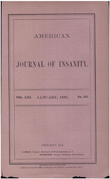Cognitive functioning in late-life schizophrenia: a comparison of elderly schizophrenic patients and patients with Alzheimer's disease
Abstract
OBJECTIVE: Previous studies have suggested that geriatric inpatients with chronic schizophrenia manifest profound cognitive impairments. This study investigated how these cognitive impairments resemble those seen in degenerative dementing conditions. METHOD: The neuropsychological battery of the Consortium to Establish a Registry for Alzheimer's Disease (CERAD), widely used to characterize the cognitive deficits of patients with Alzheimer's disease, was used to compare patterns of cognitive impairment in 66 triads of subjects consisting of one elderly patient with Alzheimer's disease, one elderly, institutionalized patient with chronic schizophrenia, and one elderly, cognitively normal comparison subject who were matched on age, gender, and education. For some analyses, the two groups of patients were divided into subgroups according to the degree of their cognitive impairment (mild, moderate, or severe) as determined by their scores on the Mini-Mental State examination. RESULTS: Relative to the comparison subjects, both groups of patients showed cognitive deficits on each of the neuropsychological measures. The schizophrenic patients performed worse than the patients with Alzheimer's disease on tests of naming and constructional praxis but were less impaired on the test of delayed word recall. These differences were consistent across all levels of severity of globally measured cognitive impairment. CONCLUSIONS: Consistent with earlier findings from postmortem studies, these findings suggest that major differences exist in the neurobiologic mechanisms responsible for cognitive impairment in schizophrenia and Alzheimer's disease. Effects directly attributable to social and environmental differences between these two groups of patients may also play a role.
Access content
To read the fulltext, please use one of the options below to sign in or purchase access.- Personal login
- Institutional Login
- Sign in via OpenAthens
- Register for access
-
Please login/register if you wish to pair your device and check access availability.
Not a subscriber?
PsychiatryOnline subscription options offer access to the DSM-5 library, books, journals, CME, and patient resources. This all-in-one virtual library provides psychiatrists and mental health professionals with key resources for diagnosis, treatment, research, and professional development.
Need more help? PsychiatryOnline Customer Service may be reached by emailing [email protected] or by calling 800-368-5777 (in the U.S.) or 703-907-7322 (outside the U.S.).



